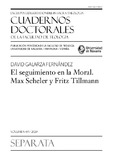Mostrar el registro sencillo del ítem
El seguimiento en la Moral. Max Scheler y Fritz Tillmann
| dc.creator | Galarza Fernández, David | es_ES |
| dc.date.accessioned | 2022-03-16T13:17:58Z | |
| dc.date.available | 2022-03-16T13:17:58Z | |
| dc.date.issued | 2020 | |
| dc.identifier.issn | 0214-6827 | |
| dc.identifier.uri | https://hdl.handle.net/2454/42531 | |
| dc.description.abstract | Extracto de la tesis doctoral del autor, que se centra en la figura de Fritz Tillmann, que, en la primera mitad del siglo XX, insistió en la idea de que el centro de la moral radica en el seguimiento de Cristo. Para cumplir este propósito, recogió la categoría filosófica de ‘seguimiento’ que había sido elaborada por Max Scheler. Inspirándose en la axiología de Scheler, Tillman conectó con la rica tradición teológica y mística contenida en la reflexión sobre la ‘imitación de Cristo’. Con esta categoría dinámica, Tillmann quiere renovar la moral católica, hacerla más atractiva y evitar la casuística. Seguir a Cristo es, en primer lugar, un seguimiento interior, algo que sólo es posible con la gracia. Por lo tanto, seguir a Cristo nos conduce inexorablemente a la mística. De este modo se aparta una falsa concepción de la moralidad que se había centrado demasiado en las obligaciones, en la determinación de qué era pecado y qué tipo de pecado. La propuesta de Tillmann no se limita a una moral de mínimos, sino que su objetivo general consiste en la llamada a la santidad. El manual de Tillmann sembró la semilla que más tarde creció y alimentó la reflexión teológica en el siglo XX. Este camino desemboca en la encíclica Veritatis Splendor de S. Juan Pablo II, donde el Magisterio de la Iglesia afirma explícitamente que seguir a Cristo es el fundamento esencial y original de la moral cristiana. Con la aportación de la categoría de ‘seguimiento de Cristo’, Tillmann se presenta como uno de los más importantes innovadores de la moral católica en el siglo XX. | es_ES |
| dc.description.abstract | This thesis focuses on the figure of Fritz Tillmann, who, in the first half of the 20th century, insisted on the idea that the center of morality consists in the following of Christ. To develop this idea, he appropriated the philosophical category of ‘following’, previously elaborated by Max Scheler. Inspired by Scheler’s axiology, Tillman connected with the rich theological and mystical tradition contained in the reflection on the ‘imitation of Christ’. With this dynamic category, Tillmann attempted to renew Catholic morality, making it more attractive and avoiding casuistry. Following Christ involves, in the first place, an interior following, something only possible with grace. Therefore, following Christ leads us inexorably to mysticism. In this manner a false conception of morality is avoided, one excessively focused on obligations, on the definition of what is sinful and the determination of types of sin. Tillmann’s proposal is not limited to a morality of minimums, since he has in view the call to holiness. Tillmann’s manual sowed the seed that later grew and nourished theological reflection in the twentieth century. This path leads to the encyclical Veritatis Splendor of St. John Paul II, in which the Magisterium of the Church explicitly affirms that the following of Christ is the essential and original foundation of Christian morality. With the contribution of the category of ‘following Christ’, Tillmann presents himself as one of the most important innovators of Catholic morality in the twentieth century. | en |
| dc.format.extent | 79 p. | |
| dc.format.mimetype | application/pdf | en |
| dc.language.iso | spa | en |
| dc.publisher | Universidad de Navarra | es_ES |
| dc.relation.ispartof | Cuadernos Doctorales de la Facultad de Teología (69), 383-457 | es_ES |
| dc.rights | Con permiso del editor | es_ES |
| dc.subject | Tillmann | es_ES |
| dc.subject | Teología moral | es_ES |
| dc.subject | Seguimiento de Cristo | es_ES |
| dc.subject | Tillmann | en |
| dc.subject | Moral theology | en |
| dc.subject | Following of Christx | en |
| dc.title | El seguimiento en la Moral. Max Scheler y Fritz Tillmann | es_ES |
| dc.title.alternative | The following in moral theology. Max Scheler and Fritz Tillmann | en |
| dc.type | info:eu-repo/semantics/article | en |
| dc.type | Artículo / Artikulua | es |
| dc.contributor.department | Ciencias Humanas y de la Educación | es_ES |
| dc.contributor.department | Giza eta Hezkuntza Zientziak | eu |
| dc.rights.accessRights | info:eu-repo/semantics/openAccess | en |
| dc.rights.accessRights | Acceso abierto / Sarbide irekia | es |
| dc.type.version | info:eu-repo/semantics/publishedVersion | en |
| dc.type.version | Versión publicada / Argitaratu den bertsioa | es |


